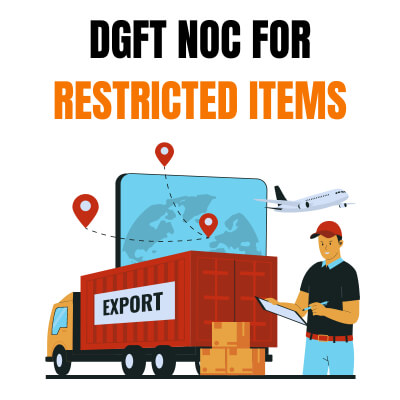
In India, foreign trade regulation and promotion fall under the purview of the Director General of Foreign Trade (DGFT). An NOC (No Objection Certificate) from the DGFT is required for some restricted commodities before import or export can begin. Businesses must be aware of this NOC's validity duration in order to maintain compliance and efficient operations. We'll discuss in this blog how long a DGFT NOC for prohibited things is good for and what you should know about it.
It's important to comprehend the DGFT NOC before delving into its validity. A document known as the DGFT NOC is issued by the DGFT and permits enterprises to import or export certain restricted goods. Restrictions on certain things may be the result of safety issues, environmental effects, or strategic considerations. The NOC makes sure that these goods are traded in accordance with national laws.
In order to preserve regulatory control over restricted commodities, the DGFT NOC is essential. Businesses are not allowed to legally import or export these goods without this certificate. Additionally, it guarantees that these goods are traded within legal bounds, lowering the possibility of illicit or unapproved trading.
For prohibited items, the duration of a DGFT NOC usually varies based on the particular item and the conditions established by the DGFT. Generally speaking, though, the NOC is only good for a year after it is issued. This indicates that the transaction for which the NOC was obtained must be completed by the importer or exporter within a year.
The DGFT NOC's validity may be prolonged in specific circumstances. The company may request an extension if they are unable to finish the import or export procedure in the allotted 12-month time frame. A request for an extension must be sent to the DGFT, together with an explanation of the delay and any supporting documentation. After reviewing the request, the DGFT issues an extension if it is satisfied.
Several factors can influence the validity period of the DGFT NOC:
Monitoring the DGFT NOC's expiration date is one of the most important parts of compliance. To make sure that the import or export procedure is finished within the validity time, businesses should set reminders well in advance.
Regular notifications from the DGFT could affect the NOC's validity. Companies should keep a close eye on these notifications to stay updated on any modifications to laws or guidelines that may have an impact on their NOC.
Complete documentation is necessary for compliant and efficient processing. Make sure that all required DGFT NOC documentation is kept up-to-date and easily available. This covers the actual NOC, any communications with the DGFT, and documentation related to the import or export procedure.
In the event that it turns out that the import or export procedure cannot be finished within the first validity period, companies ought to submit an application for an extension right away. If you wait until the last minute, the NOC may expire or there may be needless delays.
The company can be in legal hot water if the DGFT NOC expires before the import or export procedure is finished. Penalties, fines, or even the seizure of products could be part of this. Until the problem is fixed, the company might also not be allowed to deal with banned commodities in the future.
Considerable financial losses may result from a NOC that has expired. Penalties, lost products, or the inability to finish the transaction could cause this. In addition, if the company is unable to perform its obligations as a result of a NOC expiring, it may lose the confidence of partners and customers.
In the cutthroat realm of global trade, credibility is paramount. A company's reputation could be harmed by an expired DGFT NOC, which could result in the loss of customers and future possibilities. Maintaining a positive company reputation requires making sure the NOC is still valid and that all transactions are finished within the deadline.
The secret to preventing a DGFT NOC from expiring is effective preparation. Companies should schedule their import and export procedures well in advance, taking into account any delays that can impact the schedule.
Businesses can prepare for potential changes that may affect the validity of their NOC by staying up to date on regulations and DGFT notices. Consulting with legal counsel or trade specialists on a regular basis can yield insightful information as well.
Businesses can manage their trade documents with the use of a number of automated technologies, one of which is the ability to track the validity of the DGFT NOC. When the expiration date approaches, these tools can notify you and help you organize the relevant paperwork.
It can be helpful to speak with specialists in DGFT rules if there is any uncertainty about the applicability or validity of the DGFT NOC. They can offer direction on navigating the procedure and guarantee that the NOC is still in effect.
For more details, please visit Metacorp
To apply online for DGFT NOC for restricted items, please visit DGFT Portal
An essential document for companies importing or exporting sensitive commodities is the DGFT NOC for prohibited items. Complying with the terms of this NOC, which are normally 12 months, and knowing how to renew it are crucial for preventing financial or legal repercussions. Businesses may guarantee the validity of their DGFT NOC and the smooth operation of their trade operations by keeping themselves informed, making plans in advance, and keeping up with the necessary documents.





We are the pioneers in offering environmental consulting services to our patrons, giving us the first mover advantage & keeping us ahead of our competitors.
Very experienced in filing, monitoring & issuance of CDSCO Certificates, Drugs Licensing, Environmental Impact Assessment, AERB certificates, Pollution Control Board CTE & CTO, Waste Management Authorization from State Pollution Control Boards, Fertilizers & Insecticides Licensing
